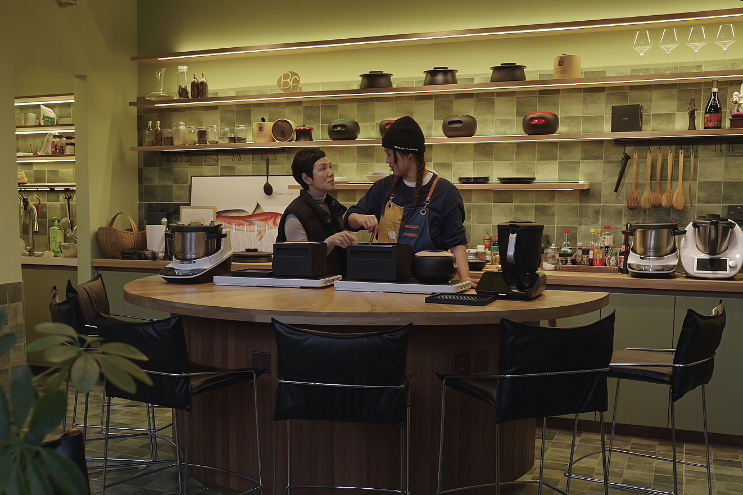Livestreaming-business boon for users
China's shift to e-commerce has allowed some entrepreneurs and celebrities to cash in, Xu Haoyu reports.

Last year in her livestreaming room, Huang Wei (better known as Viya) single-handedly sold 30 billion yuan ($4.4 billion) worth of products. That is about equal to the annual China sales of chain supermarket Carrefour. It was only the third year that Huang began selling products via livestreaming.
Born in 1985 in Anhui province, Huang is one of the top e-commerce livestreaming anchors on Chinese online shopping platform Taobao.
Huang, who had been a singer, started business in a 6-square-meter clothing shop at a wholesale market in Beijing, together with her husband, in 2003. They later moved to Xi'an and eventually opened seven shops, thanks to their strong sense of fashion trends.
Things changed when Huang met a girl who opened the Taobao app to shop online for a better deal after fitting at Viya's shop.
"At first I felt mad, but I realized right away that she made a wise move," Huang says.
Huang soon closed all offline shops and switched her focus to online sales. As she recalls, it was not easy at all. They sold two of their houses to repay a debt of 2 million yuan in the first year, but they were persistent.
In May 2016, Huang began testing the waters in livestreaming, a new format provided by Taobao to sell products to audiences through real-time interaction. To differentiate herself from competitors, Huang chose to sell in a wide range of categories, including not only clothing and makeup products, but also food, home appliances and daily necessities. She gradually developed her store into a "one-stop solution" for many shoppers who admired her taste and trusted her to supply products for all aspect of their lives.
As Huang's popularity grew and more customers adopted livestreaming as a channel to make purchases, it appears that there was nothing Huang couldn't sell-she sold 430,000 kilograms of rice in 1 minute, 814 houses in 20 minutes, and even a rocket-launching service that's worth 40 million yuan.
"Some would say I'm good at selling everything, but I can't take the credit," Huang says. "E-commerce livestreaming is affecting everyone's consumption habits and some traditional offline industries are now trying to transform."
Huang is also using her skills to help others. In 2019, she began traveling to various underprivileged areas including Yunnan, Anhui, Qinghai and Henan provinces, promoting special local products through over 50 livestreams. She generated more than 530 million yuan in sales.
Just a couple weeks ago, Huang was elected to the 13th committee of the All-China Youth Federation.
"It couldn't be more reasonable for the representatives of a new industry to become youth committee members," commented CCTV presenter Bai Yansong. "It's only weird if such a thing didn't happen. The new format meets social demand and it has gradually become part of everyday life."
In a report released by Taobao, livestreaming is considered a must-have distribution channel for merchants. Taobao Live contributed to the most significant increase: 5.1 billion yuan sales were made through livestreaming on the first day of the June 18 shopping festival this year.
Luo Yonghao, founder of technology company Smartisan, went on air on the short video and livestreaming platform Douyin for the first time on April 1. That day, he achieved over 110 million yuan in turnover.
"E-commerce livestreaming has redefined the relationship between people and products and consumption," economist Wu Xiaobo wrote in his blog. "It puts people first, promoting the circulation efficiency of products and creating a consumption occasion. Consumers' trust in products is subtly replaced by their trust in people."
Star anchors
"In the past four years, livestreaming e-commerce has just grown from a child to a teenager," Huang says. "It's experiencing a spring when all flowers bloom together."
A vast variety of people are rushing into the industry. During the June 18 shopping festival, more than 300 celebrities, 600 entrepreneurs, county governors and judges joined livestreaming on Taobao.
When celebrities showed up on the livestreams, average viewings increased by 343 percent, and the average subscription growth was 670 percent, according to Taobao.
VIP Shop, an online outlet in China, invited singing stars Xue Zhiqian and Deng Ziqi to join the livestreaming during the June event. Xue's fans contributed to 50 percent of the cart clicks and Deng helped the brand gain more than 120,000 new fans through the livestream.
Competitors are also trying to keep up. Taobao has established partnerships with many celebrities from different fields in the last year. So are another two popular short video and livestreaming platforms, Kuaishou and Douyin. Professional anchors now often invite celebrities as guest hosts to gather more public attention.
However, celebrity cachet does not always guarantee purchases.
Nice, an institution developing and managing e-commerce livestreaming anchors based in Hangzhou, Zhejiang province, took second place on the list of top institutions based on total turnover made through livestreaming during Taobao's June event.
According to Zhang Dandan, the company's vice-president, celebrities always get the best responses at the first appearance at their individual livestreams. But then, all the data including the sales volume and view begins to flop until reaching a stable stage at about their fifth or 10th time livestreaming. Zhang claims it takes a period for consumers to realize whether the anchor is promoting quality products that meet their needs.
According to an August monthly sales ranking released by e-commerce research institutions, Huang made an industry-leading turnover of 2.46 billion yuan. Li Jiaqi, who took second place, sold 1.3 billion yuan worth of products.
Behind the blockbuster sales, there are hectic days and sleepless nights, especially for full-time livestreamers like Huang and Li, who built their reputations from the ground up.
In the past 30 days, both have hosted 25 streaming sessions, according to Pangqiu, a website that collects livestream e-commerce data.
Huang's job has turned her voice hoarse, but she couldn't afford pausing work for treatment. Li got severe bronchitis from a combination of staying up late as well as eating and resting irregularly.
Li said in an interview that if he stopped livestreaming today, he'd probably lose his fans to thousands of other livestreams, and they'd stop watching him from the following day.
Behind Huang, there is a team of 300 people, rigorously testing and filtering products to feature in their livestreams. Every day, she'd personally spend four hours reviewing all the products before going on air, according to Zhang Fei from Huang's publicity team.
Huang considers herself an anchor who entered the industry earlier and understands consumers' needs for products and services better: "I think that for an e-commerce anchor to gain a foothold in the industry, fan base and click rate is not the necessary condition, but more of a result. Allowing fans and consumers to fully understand a product and its value through their mobile phone screen is the core competitiveness of a professional e-commerce anchor."
Lu Min, an internet celebrity, who now works for a livestreaming anchor agency Ziyi, has more than one million fans on Douyin. She tried e-commerce livestreaming for the first time on Chinese Valentine's Day on Aug 25. She sold 30,000-yuan products in four hours, a result satisfying both to her and Zhao Yingzi, a co-founder of the company.
Before the livestream, Lu and four teammates spent a week selecting products to feature and predicting what problems might occur. They worked till early in the morning for the entire week.
During livestreaming, Zhao set up some challenges to test Lu's ability to make immediate responses, including setting a wrong selling price and the wrong amount of goods in the inventory.
"Professional e-commerce livestreamers must go through a rough time to realize that one's glory is a result of team effort," Zhao says.
Zhang Dandan says normally professional anchors who started from "nobody" have bigger ambitions for success, which drives them to spend more time and energy studying and discovering quality products to feature through livestreaming.
Zhang Dandan and Huang both agree that celebrities entering the field don't completely displace professional practitioners. She says that it promotes the influence of livestreaming e-commerce and develops people's consumption habits. Huang claims that healthy competition under the premise of legal compliance is necessary because it boosts the development of the industry and makes consumers the biggest beneficiaries.
Regulations
From July 28 to 31, the 22nd meeting of the 13th standing committee of the national people's congress of Zhejiang province was held in Hangzhou. During the meeting, the newly revised Regulations on the Administration of Advertising in the province was passed. The regulation implementation started from Sept 1.
Article 20 of the new regulation stipulates: "While promoting goods or service in the form of livestream and short videos on television, internet and other media platforms, false or misleading commercial propaganda shall not be carried out."
According to Zhang Dandan and Zhao, e-commerce livestream anchors are no longer allowed to mention "a minimum price guarantee" to attract consumers' attention and promote sales, and all promotion copywriting must stick to the products' official introduction to avoid exaggerated and misleading promotions.
"There is a lot of room for imagination in content and service innovation, and technological improvement of e-commerce livestreaming," Huang says. "At the same time, it is indispensable that the industry has a more complete set of rules to give all practitioners correct guidance."



Today's Top News
- Forging a human-centered future in era of smart machines
- Land-sea trade corridor key to regional progress
- Local rules to be reviewed to help disabled
- Stronger RMB points to resilience
- US defense policy act fuels Taiwan tensions
- Japan's nuclear ambitions call for high alert: Editorial






























